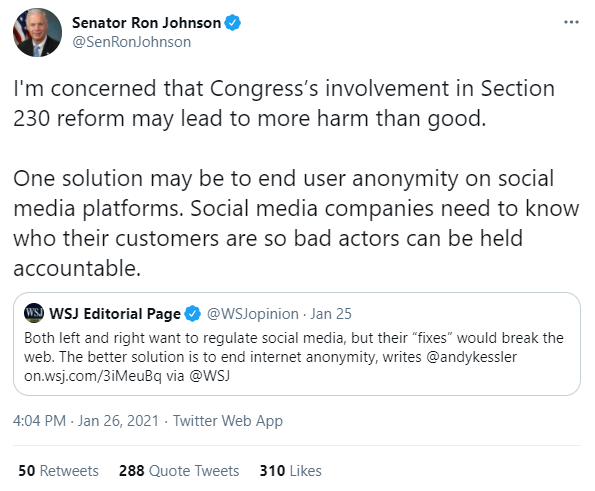It’s called bipartisanship: Both major U.S. political parties have some bad ideas for reforming Section 230 of the U.S. Communications Decency Act, the foundational internet law that shields websites from lawsuits over user-generated content or their moderation decisions.
Democrats in the U.S. Senate have introduced the “SAFE TECH Act,” which would expose website operators to greater legal liability on issues like ad fraud, stalking, and harassment, as well as clarify that companies like Facebook are not immune to foreign lawsuits for enabling war crimes or genocide. It’s well-intentioned but has numerous flaws, including overly broad language that could hold virtually any company that takes payments online legally liable for the actions of their customers and inflict massive collateral damage on the web. Other provisions could bog down website operators in frivolous lawsuits over moderation decisions, like racists suing to get their accounts back.
Republicans aren’t in a position to push any kind of bill through Congress right now, but they haven’t disappointed with the asinine proposals. GOPers have continued their long-running attacks on Section 230 and kept pushing legally nonsensical reforms to punish tech companies for supposedly discriminating against conservatives. But Sen. Ron Johnson took the cake in late January by bucking his party’s direction and instead called for an end to anonymity online.

Never mind the Constitution or anything! Christ.
It’s been a hot minute since our last edition of Hellfeed, so here’s your rundown of some of the biggest developments of the last few weeks.
Facebook’s Oversight Board issues first rulings
In case you missed it, Facebook has become a little controversial lately — you know, over little things like serving as a vector for conspiracy theories and massive disinformation campaigns, hateful propaganda, and election interference, not to mention enabling at least one genocide — and discussions over its moderation choices have become a tad bit… heated.
So it set up an Oversight Board, a supposedly independent court of academics, legal experts, politicians, and civil rights activists that depending on who you ask is either designed to whitewash Facebook’s decisions or a Pandora’s Box potentially outside the company’s control. In late January, it issued its first five decisions on matters ranging from a post in Myanmar taken down as hate speech to a post with a quote attributed to Nazi propaganda minister Joseph Goebbels. In four out of five cases, the Oversight Board ruled against Facebook’s mods.
Facebook isn’t just one of the world’s richest companies, but one of its biggest communications networks. That puts the Oversight Board in the awkward position of being seen as competing for legitimacy with norms and laws on speech that vary significantly from nation to nation (and, obviously, within them). Whether this is yet another step towards corporate dystopia, an overblown debate about policies at one company, or just Facebook pomp and circumstance, at least one of its upcoming decisions will have major ramifications.
The board is now debating whether to restore Donald Trump’s ability to post after he incited the Jan. 6 riots at the Capitol, and it’s entirely possible the board will decide to let him back on. Republicans who have long relied on a strategy of playing the refs are taking it seriously. According to the New Yorker, conservative groups lobbied the company in May 2020 in an attempt to stuff the Oversight Board with right-wing mouthpieces, and Trump personally called Mark Zuckerberg to complain about its choice of members.
One important factor here is research showing that a relative handful of accounts with huge followings are disproportionately successful at spreading lies and disinformation — such as conservatives pushing Stop the Steal, the election fraud conspiracy theory that ultimately culminated in the Capitol riots. Other research has shown that rather than bubbling up through grassroots posts by random users, election disinformation was primarily spread via an organised propaganda campaign waged by Trump, his political allies, and the right-wing media and amplified via traditional mass media. Twitter’s post-riot ban wave against Trump and his sycophants resulted in an immediately noticeable drop in hoax claims of election fraud, early research found. Finally, for all the talk of Trump’s Twitter account, his Facebook megaphone may have been as or even more important.
This is all to say that if the Oversight Board rules in favour of Trump, Facebook is going to have a real mess on its hands. A decision isn’t expected for weeks or months.
In the meantime…
Twitter isn’t bothering with the red tape and has reiterated that Trump is permanently banned, forever, even if he somehow becomes president again, and with no recourse to appeal to a panel of wonks.
Trump is reportedly spending a lot of his time writing out insults on paper and asking remaining staffers to tweet them for him. Let’s move on, shall we?
Parler will be up any day now… yep… any day now… just you wait
Parler, the right-wing Facebook clone where many Trump supporters issued death threats against members of Congress while organising and later livestreaming the Capitol riots, was driven offline last month after Amazon Web Services cancelled its hosting contract and Google and Apple removed its app from their respective stores.
Its executives, such as former NRATV blowhard Dan Bongino, have continually insisted that Parler will return any day now. It hasn’t, but it did fire CEO John Matze in some kind of feckless internal power struggle and is now facing a House Oversight Committee investigation of whether it tried to literally bribe Trump into joining.
Influencers are horrible
Instagram celebrities in Dubai are behind a gargantuan underground network in abusive animal smuggling, per a report by Bellingcat that is worth a read:
The use of social media platforms to trade in exotic animals, and the dangers of ‘cub-petting’ industries, are well-documented. But the direct link of celebrities and influencers to these practices is not. By posing with lion and tiger cubs and tagging these accounts, celebrities advertise a network engaged in the online trade in exotic animals to millions of followers. Some of these animals are brought out for photo shoots several times a month when still young, and end up being kept as a pet in private homes.
Apart from potential legal issues and the well-being of the animals themselves, the trade in exotic animals puts already threatened wildlife populations at risk of poaching.
Gamestonks
There may soon be multiple movies in development about r/WallStreetBets, the Reddit board that realised the power of crowds to carry out the same kind of reckless financial engineering done by hedge funds every day and deployed it to impressive effect over a couple of weeks.
Posters on r/WallStreetBets organised to pump up the stocks of several ailing or unimpressive companies, like Gamestop and BlackBerry, in an effort to fleece short-sellers that had placed major bets against those companies. Other major Wall Street players quickly realised what was happening and got in on the resulting speculative frenzy, with GameStop shares peaking at $US483 ($623) before promptly crashing and other targeted companies following a similar pattern. For reasons that are simultaneously incredibly stupid, very predictable, and partially due to Elon Musk, completely unrelated things like joke cryptocurrency Dogecoin got pumped, too.
The fiasco spelled disaster for stock-trading app Robinhood and is now the focus of a vaguely threatening Securities and Exchange Commission investigation focusing on market manipulation. But while it took everyone by surprise, it’s not exactly unprecedented. Stock-pumping efforts on online message boards have been around for over two decades, and it’s not like major Wall Street firms aren’t in the business of screwing with the economy to turn a quick buck.
TikTok, WeChat to probably be just fine
President Joe Biden’s administration has asked courts to halt Trump’s orders threatening to essentially blacklist TikTok, which is owned by China’s ByteDance, and Chinese messaging app WeChat from U.S. app stores.
To recap, last year the Trump admin ordered TikTok to sell off either a controlling or major stake to a U.S. or be put on Commerce Department blacklists. It mostly justified this with babble about national security risks and censorship, but it was clear that the White House’s real interest was taking hostages in the U.S.-China trade war and shaking down a Chinese company to look tough on communism (and the leading contender for the coerced deal conveniently happened to be Trump’s cronies at Oracle). The WeChat ban was purely punitive and would have cut off millions of Americans of Chinese heritage and expats from their relatives abroad.
This whole scheme fell apart as the elections approached and it became clear Trump was not going to remain in office, and there’s never been any real expectation that Biden was particularly interested in pursuing it. It’s hanging in the air for now, but it seems pretty unlikely that the apps are safe for now.
Twitter is rebranding itself
Perhaps eager to rebrand after the last four years (and under pressure following a failed shareholder revolt led by hedge fund goons last year), Twitter is rapidly rolling out new features and considering changing its business model. That includes an Instagram stories knockoff, buying out a Substack competitor in a pivot to monetised newsletters, the introduction of a weird community-operated fact-checking platform, and an audio chat feature cloning snobby Silicon Valley app Clubhouse. (Facebook is also cloning Clubhouse.)
This week, news came around that Twitter is considering offering premium features via paid subscriptions and allowing users to tip each other in cash.
Instagram threatens to sue the hell out of OGUsers
According to Vice News, Instagram has taken the unusual step of announcing it has publicly identified pseudonymous members of OGUsers, a group of cybercriminals that hack, extort, and scam their way into controlling accounts with millions of followers. The company said it has issued cease and desist orders to the people in question, threatening lawsuits if they do not comply and provide additional information on possible co-conspirators.
Detritus of the week
If social media has made you sick in the head, please take the time to hoot and holler at this ridiculous article on the Federalist asserting that Snapchat Discover is poisoning our precious youth’s minds with shows about polyamory and witchcraft.
The ban list
- Twitter banned MyPillow, the pillow company, after its pro-Trump CEO Mike Lindell got banned and cleverly decided to start tweeting conspiracy theories from the corporate account.
- Chat app Discord terminated r/WallStreetBet’s channel after the Gamestonks fiasco drew attention to an abundance of hate speech there, but later seemed to concede the ban was poorly executed and helped bring the server back online.
- Facebook algorithms banned an “overtly sexual cow” (decision since overturned).
- Twitter told Project Veritas, a right-wing group that goes “undercover” to produce deceptively edited videos and stage hoaxes, to go fuck itself.
- QAnon is so toxic it’s getting banned on platforms we’ve never even heard of, like TikTok clone Clapper.
- Clubhouse has now been banned in most of China after it briefly slipped past the notice of state censors.
